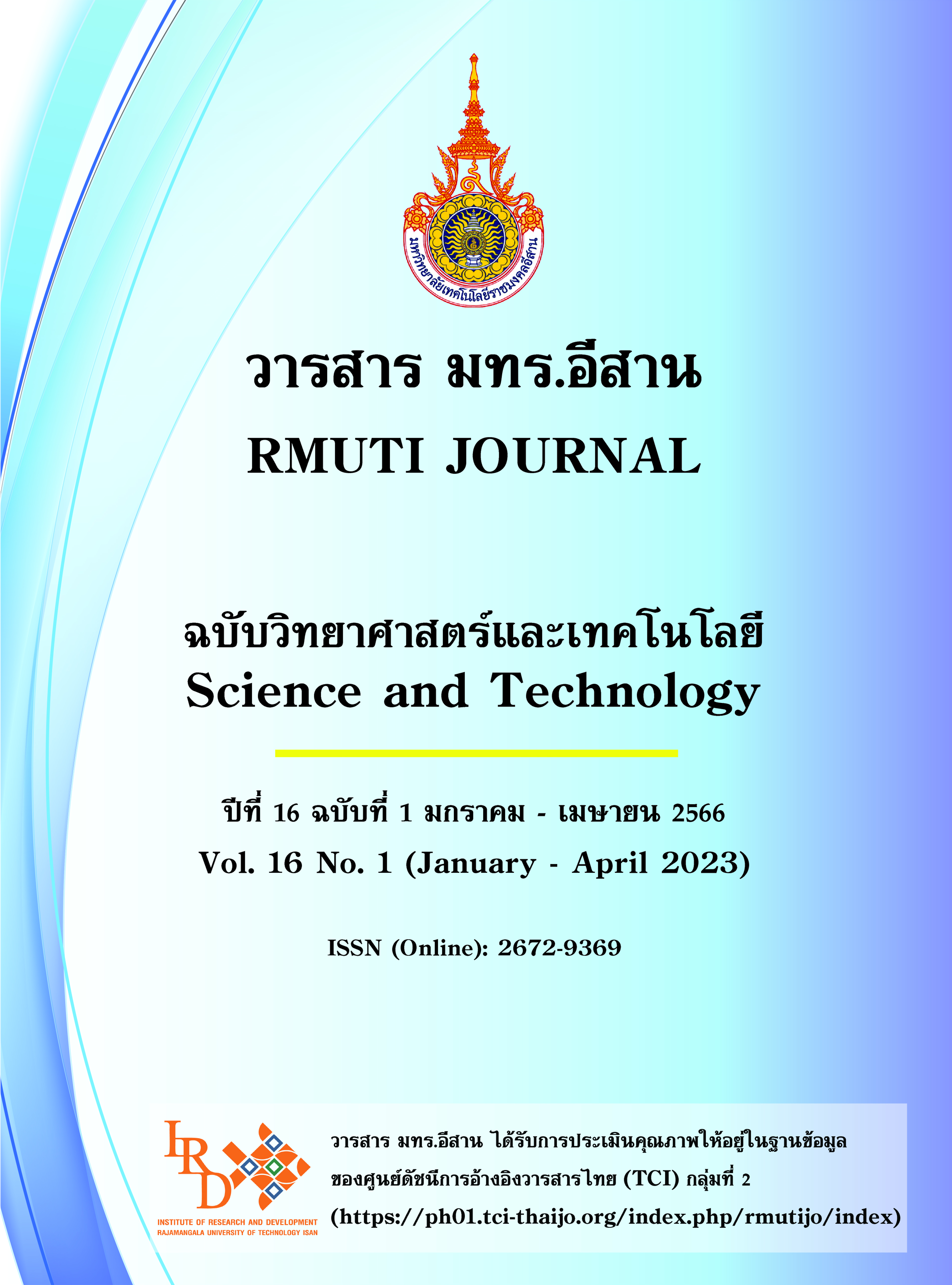Design and Development of Automatic Charcoal Briquette Machine Controlled by Programmable Logic Controllers
Main Article Content
Abstract
The objective of this research was to design, develop and test the functionality of an automatic charcoal briquette machine controlled by a programmable logic controller with a width of 1.7 m., a length of 1.5 m., and a height of 1.2 m. The programmable logic controller was designed to control the operation of a mixing system and the length of the charcoal bar. It was found that the automatic control system of the machine could control the start and stop the machine’s operation according to the conditions specified by the user. The dispensing system and the charcoal bar length could be operated according to the user's setting. The developed machine could compress the charcoal briquettes almost to perfection with a quality rate of up to 95 %. The work efficiency (calculated from time) was found to be 87 %. The average density of the charcoal bars was found to be 1.09 g/cm3. The average horizontal pressure strength of the bars was found to be 204.86 newtons. The machine had the capacity to produce 1,590 charcoal bars per hour and had a power consumption rate of 2.55 watts per hour.
Article Details

This work is licensed under a Creative Commons Attribution-NonCommercial-NoDerivatives 4.0 International License.
References
Dictionary, Royal Institute Edition 2011. (2011). Charcoal. Access (22 October 2022). Available (https://dictionary.orst.go.th/)
Nachampa, U., SengPrakhon, J., NuanSai, W., and Cherdsuk, S. (2020). Charcoal Briquette Machine. Bachelor's degree Department of Physics, Faculty of Education, Buriram Rajabhat University
Bhattacharya, S. C. and Shreatha, R. M. (1990). Biocoal Technology and Economics. RERIC. Bangkok: Asian Institute of Technology
Yuman, P. (2016). Development of a Cold Production Biomass Charcoal Briquette Machine to use Waste from Coffee Bean Processing. Industrial Technology Lampang Rajabhat University Journal. Vol. 9, No. 1, pp. 34-48 (in Thai)
Khosri, U. (2011). Charcoal Briquettes. Technology Clinic, Rajamangala University of Technology Isan Sakon Nakhon Campus. Access (4 May 2011). Available (http://www.clinictech.ops.go.th/online/pages/techlist_display.asp?tid=384)
Chin, O. C. and Siddiqui, K. M. (2000). Characteristics of Some Biomass Briquettes Prepared Under Modest Die Pressures. Biomass and Bioenergy. Vol. 18, Issue 3, pp. 223-228. DOI: 10.1016/S0961-9534(99)00084-7
Laloon, K., Sudajan, S., and Jansiri, C. (2012). Effects of Charcoal Type and Screw Pressing Speed on the Performance of Screw Press Unit and Quality of Charcoal Block. In Proceeding of the 22nd TSAE National Conference (TSAE 2021). Chiang Mai. pp. 284-290
Department of Industrial Works. (2012). Guidelines and Qualification of Wastes for Processing Into Fuel Ingots and Interlocking Blocks. Bangkok
The National Energy Policy Council. (2000). Fuel of The Future. NEPO Journal. No. 50, pp. 13-20
Poonkasemm, T. (1999). A Study of Fuel Briquettes from Durian Peel Substitute for Firewood and Charcoal in Household Used. Graduate School Mahidol University
Omron Electronics Co., Ltd., (2009). Implementation PLC Level 1. Bangkok
Hitawattanakul, C. and Yoksila, P. (2013). Development of a Hydraulic Briquette Press from Coconut Shells and Corn Cobs. B. Eng. Chemical Engineering King Mongkut's University of Technology North Bangkok
Dangphonthong, D., Pinate, W., and Rucha, A. (2016). A Comparison of the Heating Value and Density of Charcoal Briquettes Manufactured by Electric Motor and Bicycle-Powered Compressors. Industrial Technology Lampang Rajabhat University Journal. Vol. 9, No. 1, pp. 1-13
Ungphakorn, V. and Tanadngan, C. (1998). Machine Design 1. Bangkok: Se-ed ucation
Boonyatharokul, W. (1986). Pumps and Pumping Systems. Bangkok: Kasetsart University
Lalun, K. (2011). Study and Development of Charcoal Briquette Machine from Cassava Rhizomes. Master of Engineering Thesis (Agricultural and Food Engineering). Graduate School Khon Kaen University


